Ferenc Puskás
Ferenc Puskás (UK: /ˌfɛrɛnts ˈpʊʃkəʃ, ˈpʊʃkæʃ/ FERR-ents PUUSH-kəsh, PUUSH-kash,[1][2][3] Hungarian: [ˈfɛrɛnt͡s ˈpuʃkaːʃ]; né Purczeld; 1 April 1927[4] – 17 November 2006) was a Hungarian footballer and manager, widely regarded as one of the greatest players of all time and the sport's first international superstar.[5] A prolific forward, he scored 84 goals in 85 international matches for Hungary, played 4 international matches for Spain and scored 514 goals in 529 matches in the Hungarian and Spanish leagues. He became an Olympic champion in 1952 and led his nation to the final of the 1954 World Cup where he was named the tournament's best player. He won three European Cups (1959, 1960, 1966), 10 national championships (5 Hungarian and 5 Spanish Primera División) and 8 top individual scoring honors. In 1995, he was recognized as the top scorer of the 20th century by the IFFHS.[6][7][8]
 Puskás as Panathinaikos manager in 1971 | ||||||||||||||||||||||
| Personal information | ||||||||||||||||||||||
|---|---|---|---|---|---|---|---|---|---|---|---|---|---|---|---|---|---|---|---|---|---|---|
| Full name | Ferenc Purczeld | |||||||||||||||||||||
| Date of birth | 1 April 1927 | |||||||||||||||||||||
| Place of birth | Budapest, Hungary | |||||||||||||||||||||
| Date of death | 17 November 2006 (aged 79) | |||||||||||||||||||||
| Place of death | Budapest, Hungary | |||||||||||||||||||||
| Height | 1.72 m (5 ft 8 in) | |||||||||||||||||||||
| Playing position(s) | Forward | |||||||||||||||||||||
| Senior career* | ||||||||||||||||||||||
| Years | Team | Apps | (Gls) | |||||||||||||||||||
| 1943–1956 | Budapest Honvéd[lower-alpha 1] | 350 | (358) | |||||||||||||||||||
| 1958–1966 | Real Madrid | 180 | (156) | |||||||||||||||||||
| Total | 530 | (514) | ||||||||||||||||||||
| National team | ||||||||||||||||||||||
| 1945–1956 | Hungary | 85 | (84) | |||||||||||||||||||
| 1961–1962 | Spain | 4 | (0) | |||||||||||||||||||
| Teams managed | ||||||||||||||||||||||
| 1966–1967 | Hércules | |||||||||||||||||||||
| 1967 | San Francisco Golden Gate Gales | |||||||||||||||||||||
| 1968 | Vancouver Royals | |||||||||||||||||||||
| 1968–1969 | Alavés | |||||||||||||||||||||
| 1970–1974 | Panathinaikos | |||||||||||||||||||||
| 1975 | Real Murcia | |||||||||||||||||||||
| 1975–1976 | Colo-Colo | |||||||||||||||||||||
| 1976–1977 | Saudi Arabia | |||||||||||||||||||||
| 1978–1979 | AEK Athens | |||||||||||||||||||||
| 1979–1982 | Al Masry | |||||||||||||||||||||
| 1985–1986 | Sol de América | |||||||||||||||||||||
| 1986–1989 | Cerro Porteño | |||||||||||||||||||||
| 1989–1992 | South Melbourne Hellas | |||||||||||||||||||||
| 1993 | Hungary | |||||||||||||||||||||
Honours
| ||||||||||||||||||||||
| * Senior club appearances and goals counted for the domestic league only | ||||||||||||||||||||||
He was the son of former footballer Ferenc Puskás Senior. Puskás started his career in Hungary playing for Kispest and Budapest Honvéd. He was the top scorer in the Hungarian League on four occasions, and in 1948, he was the top goal scorer in Europe. During the 1950s, he was both a prominent member and captain of the Hungarian national team, known as the Mighty Magyars. In 1958, two years after the Hungarian Revolution, he emigrated to Spain where he played for Real Madrid. While playing with Real Madrid, Puskás won four Pichichis and scored seven goals in two European Champions Cup finals.
After retiring as a player, he became a coach. The highlight of his coaching career came in 1971 when he guided Panathinaikos to the European Cup final, where they lost 2–0 to AFC Ajax. In 1993, he returned to Hungary and took temporary charge of the Hungarian national team.[9] In 1998, he became one of the first ever FIFA/SOS Charity ambassadors.[10] In 2002, the Népstadion in Budapest was renamed the Puskás Ferenc Stadion in his honor.[11] He was also declared the best Hungarian player of the last 50 years by the Hungarian Football Federation in the UEFA Jubilee Awards in November 2003.[12] In October 2009, FIFA announced the introduction of the FIFA Puskás Award, awarded to the player who has scored the "most beautiful goal" over the past year. He was also listed in Pelé's FIFA 100.
Career in Hungary
Early years
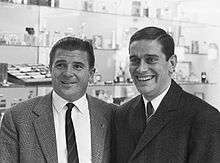
Ferenc Purczeld was born on 1 April 1927 to a German (Danube Swabian) family in Budapest and brought up in Kispest, then a suburb, today part of the city. His mother, Margit Biró (1904–1976), was a seamstress. He began his career as a junior with Kispest AC,[11] where his father, who had previously played for the club, was a coach. He had grandchildren, who were the children of his brothers son; the two sons of his brother are Zoltan and Istvan, the first one have 3 children; Ilonka, Camila and Andrés, and the second one have two.
He changed his name to Puskás. He initially used the pseudonym "Miklós Kovács" to help circumvent the minimum age rules[13] before officially signing at the age of 12. Among his early teammates was his childhood friend and future international teammate József Bozsik. He made his first senior appearance for Kispest in November 1943 in a match against Nagyváradi AC.[14] It was here where he got the nickname "Öcsi" or "Buddy".[15]
Kispest was taken over by the Hungarian Ministry of Defence in 1949, becoming the Hungarian Army team and changing its name to Budapest Honvéd. As a result, football players were given military ranks. Puskás eventually became a major (Hungarian: Őrnagy), which led to the nickname "The Galloping Major".[16] As the army club, Honvéd used conscription to acquire the best Hungarian players, leading to the recruitment of Zoltán Czibor and Sándor Kocsis.[17] During his career at Budapest Honvéd, Puskás helped the club win five Hungarian League titles. He also finished as top goal scorer in the league in 1947–48, 1949–50, 1950 and 1953, scoring 50, 31, 25 and 27 goals, respectively. In 1948, he was the top goal scorer in Europe.[18]
Mighty Magyars
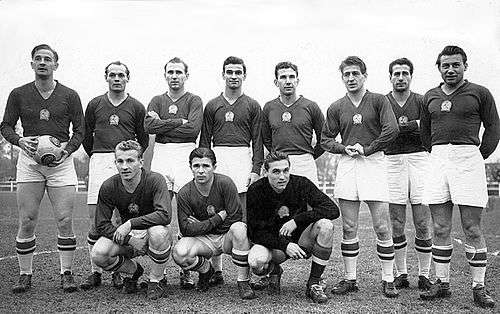
front row: Mihály Lantos, Ferenc Puskás, Gyula Grosics
back row: Gyula Lóránt, Jenő Buzánszky, Nándor Hidegkuti, Sándor Kocsis, József Zakariás, Zoltán Czibor, József Bozsik, László Budai
Puskás made his debut for Hungary team on 20 August 1945 and scored in a 5–2 win over Austria.[19] He went on to play 85 games and scored 84 times for Hungary. His international goal record included two hat tricks against Austria, one against Luxembourg and four goals in a 12–0 win over Albania.[20] Together with Zoltán Czibor, Sándor Kocsis, József Bozsik, and Nándor Hidegkuti, he formed the nucleus of the Golden Team that was to remain unbeaten for 32 consecutive games.[21] During this run, they became Olympic Champions in 1952, beating Yugoslavia 2–0 in the final in Helsinki. Puskás scored four times at the Olympic tournament,[20] including the opening goal in the final. They also defeated England twice, first with a 6–3 win at Wembley Stadium.,[19] and then 7–1 in Budapest. Puskás scored two goals in each game against England. In 1953, they also became Central European Champions. Hungary won the championship after finishing top of the table with 11 points. Puskás finished the tournament as top scorer with 10 goals and scored twice as Hungary claimed the trophy with a 3–0 win over Italy at the Stadio Olimpico in 1953.
Puskás scored three goals in the two first-round matches Hungary played at the 1954 FIFA World Cup. They defeated South Korea 9–0 and then West Germany 8–3. In the latter game, he suffered a hairline fracture of the ankle after a tackle by Werner Liebrich, and did not return until the final.
Puskás played the entire 1954 World Cup final against West Germany with a hairline fracture. Despite this, he scored his fourth goal of the tournament to put Hungary ahead after six minutes, and with Czibor adding another goal two minutes later, it seemed that the pre-tournament favorites would take the title. However, the West Germans pulled back two goals before half time, with six minutes left the West Germans scored the winner. Two minutes from the end of the match, Puskás appeared to score an equalizer but the goal was disallowed due to an offside call.[22]
Ferenc Puskás’ statistics in the 1952 Helsinki Olympics
The scores contain links to the article on football in the Helsinki Olympics and the round in question.
| Game no. | Round | Date | Opponent | Puskás’ playing time | Score | Puskás’ goals | Score | Times | Venue | Report |
|---|---|---|---|---|---|---|---|---|---|---|
| 1 | Prel. R. | 15 July 1952 | 90 min. | 2–1 (1–0) | 0 | — | — | Kupittaa, Turku | [23] | |
| 2 | 1st R | 21 July 1952 | 90 min. | 3–0 (2–0) | 0 | — | — | Pallokenttä, Helsinki | [24] | |
| 3 | QF | 24 July 1952 | 90 min | 7–1 (2–0) | 2 | 4–0 6–1 | Urheilukeskus, Kotka | [25] | ||
| 4 | SF | 28 July 1952 | 90 min | 6–0 (3–0) | 1 | 1–0 | Helsinki Olympic Stadium | [26] | ||
| 5 | Final | 2 August 1952 | 90 min | 2–0 (0–0) | 1 | 1–0 | Helsinki Olympic Stadium | [27] |
Ferenc Puskás’ statistics at the 1954 World Cup in Switzerland
The scores contain links to the article on 1954 FIFA World Cup and the round in question. When there is a special article on the match in question, the link is in the column for round.
| Game no. | Round | Date | Opponent | Puskás’ playing time | Score | Puskás’ goals | Score | Times | Venue | Report |
|---|---|---|---|---|---|---|---|---|---|---|
| 1 | Group 2 | 17 June 1954 | 90 min. | 9–0 (4–0) | 2 | 1–0 9–0 | Hardturm Stadium, Zürich | [28] | ||
| 2 | Group 2 | 20 June 1954 | 90 min | 8–3 (3–1) | 1 | 2–0 | St. Jakob Stadium, Basel | [29] | ||
| – | QF | 27 June 1954 | Did not play | 4–2 (2–1) | 0 | – | — | Wankdorf Stadium, Bern | [30] | |
| – | SF | 30 June 1954 | Did not play | 4–2 (a.e.t.) (2–2, 1–0) | 0 | – | — | Stade Olympique de la Pontaise, Lausanne | [31] | |
| 3 | Final | 4 July 1954 | 90 min | 2–3 (2–2) | 1 | 1–0 | Wankdorf Stadium, Bern | [32] |
Honvéd World Tour
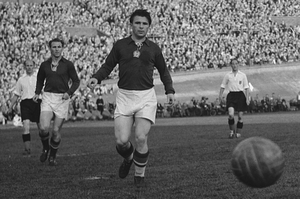
Budapest Honvéd entered the European Cup in 1956 and were drawn against Atlético Bilbao in the first round. Honvéd lost the away leg 2–3, but before the home leg could be played, the Hungarian Revolution erupted in Budapest. The players decided against going back to Hungary and arranged for the return with Atlético to be played at Heysel Stadium in Brussels, Belgium.[21] Puskás scored in the subsequent 3–3 draw but Honvéd were eliminated 6–5 on aggregate, and the Hungarian players were left in limbo. They summoned their families from Budapest, and despite opposition from FIFA and the Hungarian football authorities, they organised a fundraising tour of Italy, Portugal, Spain, and Brazil. After returning to Europe, the players parted ways. Some, including Bozsik, returned to Hungary while others, including Czibor, Kocsis and Puskás, found new clubs in Western Europe.[33] Puskás did not return to Hungary until 1981.[34]
Spanish career
Real Madrid
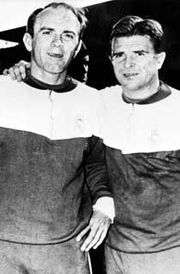
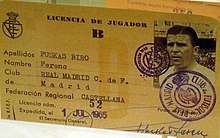
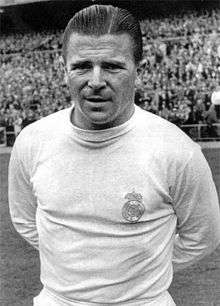
After refusing to return to Hungary, Puskás initially played a few unofficial games for RCD Espanyol. At the same time, both AC Milan and Juventus attempted to sign him, but then he received a two-year ban from UEFA (for refusing to return to Budapest[35]) which prevented him from playing in Europe. He moved to Austria and then Italy.[21] After his ban, Puskás tried to play in Italy but was not able to find a top-flight club willing to sign him, as Italian managers were concerned about his age and weight.[17] He was considered by Manchester United to strengthen a squad ravaged by the Munich Air Disaster in 1958, but because of FA rules regarding foreigners and Puskás' not knowing the English language, stand-in manager Jimmy Murphy could not fulfill his wish of signing the Hungarian. However, a few months later, Puskás joined Real Madrid and at the age of 31 embarked on the second phase of his career.
During his first La Liga season, Puskás scored four hat-tricks, including one in his second game, against Sporting de Gijón on 21 September 1958. In the game against UD Las Palmas on 4 January 1959, Puskás and Alfredo di Stéfano scored hat-tricks in a 10–1 win.[36] During the 1960–61 season, Puskás scored four times in a game against Elche CF and the following season, he scored five goals against the same team. Puskás scored two hat-tricks against FC Barcelona in 1963, one at the Bernabéu and one at the Camp Nou. During eight seasons with Real, Puskás played 180 La Liga games and scored 156 goals. He scored 20 or more goals in each of his first six seasons in the Spanish league, and won the Pichichi four times: in 1960, 1961, 1963, and 1964, scoring 25, 28, 26 and 21 goals, respectively. He helped Real win La Liga five times in a row between 1961 and 1965 and the Copa del Generalísimo in 1962. He scored both goals in the 2–1 victory over Sevilla FC in the Copa final.
Puskás also played a further 39 games for Real in the European Cup, scoring 35 goals. He helped Real reach the final of the 1959 European Cup, scoring in the first leg and in the decisive replay of the semi-final against Atlético Madrid, but missed the final due to injury. In the following season he began Real's 1960 European Cup campaign with a hat-trick against Jeunesse Esch and in the semi-final against FC Barcelona, he once again guided Real into the final with three goals over two legs. In the final itself, Real beat Eintracht Frankfurt 7–3 with Puskás scoring four goals[11] and di Stéfano scoring three. In subsequent European campaigns, he would score a further three hat-tricks, including one in the 1962 final against Benfica, which Real lost 5–3. In 1965, he scored five goals over two games against Feyenoord as he helped Real Madrid to the 1966 European Cup final – Real won the game against Partizan Belgrade, but Puskás did not play in the final.
Spanish national appearances
In 1962, Puskás took Spanish nationality,[37] and subsequently played four times for Spain. Three of these games were at the 1962 World Cup. In Spain he was known as Canoncito Pum (the booming cannon).[34]
Appearance for South Liverpool
In 1967, at the age of 40, he appeared in a fundraising friendly game for South Liverpool, the English non-League side, in front of a 10,000-strong sell-out crowd at the club's Holly Park stadium.[38]
Management career
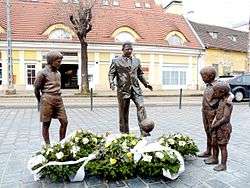
After retiring as a player, Puskás became a coach and managed teams in Europe, North America, South America, Africa, Asia, and Australia.
In 1971, he guided Panathinaikos of Greece to the European Cup final, the only time a Greek club has reached a European final to date. In the qualifying rounds they beat Everton in the quarter-finals on away goals, then defeated Red Star Belgrade in the semis. In the final Panathinaikos lost 2–0 to Johan Cruyff's Ajax.[39] During his four-year tenure at Panathinaikos, Puskás helped the team secure one Greek Championship in 1972. However, with the notable exception of his spell at Panathinaikos, Puskás failed to transfer his success as a player to his coaching career.
Despite his wide travels, his only other success came with South Melbourne Hellas, with whom he won the National Soccer League title in 1991.
When Wolverhampton Wanderers opened their renovated stadium Molineux in 1993, Puskás visited the newly opened stadium as an honorary guest to watch the friendly match between Wolves and Budapest Honvéd, which was a match to christen the new opening of the stadium. This was because in the 1950s, Wolves played a game against Honvéd in a memorable friendly match, which Puskás played in. Wolves won the 1954 match 3–2, with the 1993 match ending in a 1–1 draw.
Puskás returned back to Hungary for the first time in 1981 and in 1990, he made Budapest his home again.[34] In 1993, he took charge of the Hungarian national football team for four games, including a 4–2 friendly victory against the Republic of Ireland in Dublin, where Hungary came from two goals down to eventually beat their opponents.[40]
Later life and death
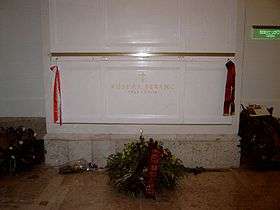
Puskás was diagnosed with Alzheimer's disease in 2000.[41] He was admitted to a Budapest hospital in September 2006[42] and died on 17 November 2006[41] of pneumonia. He was 79 years old and was survived by his wife of 57 years, Erzsébet,[43] and their daughter, Anikó.[44] In a state funeral, his coffin was moved from Puskás Ferenc Stadion to Heroes' Square for a military salute. He was buried under the dome of the St Stephen's Basilica in Budapest on 9 December 2006.
Legacy
- The Népstadion in Budapest was renamed the Puskás Ferenc Stadion in 2002.[11]
- Asteroid 82656 Puskás, discovered by Krisztián Sárneczky and Gyula M. Szabó in 2001, was named in his honor.[45] The official naming citation was published by the Minor Planet Center on 9 August 2006 (MPC 57425).[46]
- A street named Újtemető utca near Stadium Bozsik in the Hungarian capital of Budapest (specifically the district of Kispest) was renamed after Puskás precisely one year after the footballer's death.
- The new Puskás Aréna, its metro station, Puskás Akadémia FC, Puskás Cup, and the FIFA Puskás Award all bear his name.
- A statue of Puskás was unveiled in 2017 in Melbourne, Australia, near the former site of the now demolished Olympic Park Stadium, where he led South Melbourne Hellas to the 1991 NSL Championship as manager.
Honours
Player
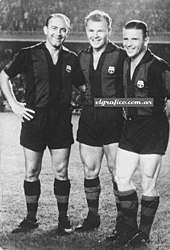
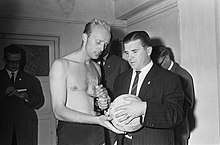
- Budapest Honvéd
- Hungarian League: 1949–50, 1950, 1952, 1954, 1955
- Real Madrid
- Spanish League: 1960–61, 1961–62, 1962–63, 1963–64, 1964–65
- Spanish Cup: 1961–62
- European Cup: 1958–59, 1959–60, 1965–66
- Intercontinental Cup: 1960
- Hungary
- Balkan Cup Champions: 1947
- Olympic Champions: 1952
- Central European Champions: 1953
- FIFA World Cup Runners-up: 1954
- Individual
- Ballon d'Or Silver Award: 1960[47]
- Hungarian Football Federation Player of the Year: 1950[48]
- Central European International Cup top scorer: 1954
- Hungarian top scorer: 1947–48, 1949–50, 1950, 1953
- Spanish League top scorer (Pichichi Trophy): 1959–60, 1960–61, 1962–63, 1963–64
- European Cup top scorer: 1959–60, 1953–64
- Golden Boot of the World: 1948
- World Soccer Player of the Year: 1953[49]
- World Soccer World XI: 1960, 1961, 1962, 1963[50]
- 1954 FIFA World Cup: Golden Ball
- 1954 FIFA World Cup: All-Star Team
- European Player of the 20th century – L'Equipe
- Hungarian Player of the 20th century – IFFHS[51]
- Football's Top Scorer of the 20th century – IFFHS
- Member of the FIFA 100
- UEFA Golden Player: Greatest Hungarian Footballer of the last 50 Years
- Inaugural Inductee into Goal Hall of Fame 2014
- Top 10 Greatest Players of the 20th century (#7) – World Soccer Magazine
- Top 10 World's Best Players of the 20th century (#6) – IFFHS[51]
- Top 10 Europe's Best Players of the 20th century (#4) – IFFHS[51]
- Golden Foot: 2006 (as a legend)[52]
- IFFHS Legends[53]
Manager
- Panathinaikos
- Sol de América
- South Melbourne Hellas
- National Soccer League: 1990–91
- NSL Cup: 1989–90
- Dockerty Cup: 1989, 1991
Career statistics
Club
Source:[54]
| Performance | Liga | Copa | Continental | Total | ||||||
|---|---|---|---|---|---|---|---|---|---|---|
| Season | Club | League | Matches | Goals | Matches | Goals | Matches | Goals | Matches | Goals |
| Hungary | Nemzeti Bajnokság I | Magyar Kupa | Europe | Total | ||||||
| 1943–44 | Kispest | Nemzeti Bajnokság I | 18 | 7 | - | - | - | - | 18 | 7 |
| 1944–45 | 2 | 1 | - | - | - | - | 2 | 1 | ||
| 1944 | 11 | 6 | - | - | - | - | 11 | 6 | ||
| 1945 | 20 | 10 | - | - | - | - | 20 | 10 | ||
| 1945–46 | 34 | 36 | - | - | - | - | 34 | 36 | ||
| 1946–47 | 29 | 32 | - | - | - | - | 29 | 32 | ||
| 1947–48 | 31 | 50 | - | - | - | - | 31 | 50 | ||
| 1948–49 | 28 | 46 | - | - | - | - | 28 | 46 | ||
| 1949–50 | Budapesti Honvéd SE | Nemzeti Bajnokság I | 30 | 31 | - | - | - | - | 30 | 31 |
| 1950 | 15 | 25 | - | - | - | - | 15 | 25 | ||
| 1951 | 21 | 21 | 2 | 1 | - | - | 23 | 23 | ||
| 1952 | 26 | 22 | - | - | - | - | 26 | 22 | ||
| 1953 | 26 | 27 | 3 | 12 | - | - | 29 | 39 | ||
| 1954 | 20 | 21 | - | - | - | - | 20 | 21 | ||
| 1955 | 26 | 18 | 6 | 4 | 4 | 3 | 36 | 25 | ||
| 1956 | 13 | 5 | - | - | 2 | 1 | 15 | 6 | ||
| Spain | La Liga | Copa del Generalísimo | European Cup | Total | ||||||
| 1958–59 | Real Madrid | La Liga | 24 | 21 | 5 | 2 | 5 | 2 | 34 | 25 |
| 1959–60 | 24 | 25 | 5 | 10 | 7 | 12 | 36 | 47 | ||
| 1960–61 | 28 | 28 | 9 | 14 | 4 | 2 | 41 | 44 | ||
| 1961–62 | 23 | 20 | 8 | 13 | 9 | 7 | 40 | 40 | ||
| 1962–63 | 30 | 26 | 7 | 5 | 2 | 0 | 39 | 31 | ||
| 1963–64 | 25 | 21 | 0 | 0 | 8 | 7 | 33 | 28 | ||
| 1964–65 | 18 | 11 | 4 | 4 | 3 | 2 | 25 | 17 | ||
| 1965–66 | 8 | 4 | 3 | 1 | 3 | 5 | 14 | 10 | ||
| Country | Hungary | 350 | 358 | 11 | 17 | 6 | 4 | 367 | 380 | |
| Spain | 180 | 156 | 41 | 49 | 41 | 37 | 262 | 242 | ||
| Total | 530 | 514 | 52 | 66 | 47 | 41 | 629 | 622 | ||
International
| Hungary national team | ||
|---|---|---|
| Year | Apps | Goals |
| 1945 | 2 | 3 |
| 1946 | 3 | 3 |
| 1947 | 5 | 5 |
| 1948 | 6 | 7 |
| 1949 | 8 | 11 |
| 1950 | 6 | 12 |
| 1951 | 3 | 4 |
| 1952 | 12 | 10 |
| 1953 | 7 | 6 |
| 1954 | 11 | 8 |
| 1955 | 12 | 10 |
| 1956 | 9 | 4 |
| Total | 85 | 84 |
| Spain national team | ||
|---|---|---|
| Year | Apps | Goals |
| 1961 | 1 | 0 |
| 1962 | 3 | 0 |
| Total | 4 | 0 |
International appearances for Spain
| Date | Venue | Opponent | Score | Competition |
|---|---|---|---|---|
| 12 November 1961 | Casablanca, Casablanca, Morocco | 1–0 | 1962 FIFA World Cup qualification | |
| 31 May 1962 | Estadio Sausalito, Viña del Mar, Chile | 0–1 | 1962 FIFA World Cup | |
| 3 June 1962 | Estadio Sausalito, Viña del Mar, Chile | 1–0 | 1962 FIFA World Cup | |
| 6 June 1962 | Estadio Sausalito, Viña del Mar, Chile | 1–2 | 1962 FIFA World Cup |
See also
- Golden Team
- Puskás Cup
- FIFA Puskás Award
- List of top international association football goal scorers by country
- List of men's association football players with 50 or more international goals
- List of Soviet and Eastern Bloc defectors
- List of Spain international footballers born outside Spain
- List of association football families
Notes
- Before 1950 the club name was Kispesti A.C.
References
- "Puskas". Collins English Dictionary. HarperCollins. Archived from the original on 14 August 2019. Retrieved 14 August 2019.
- "Puskas, Ferenc". Lexico UK Dictionary. Oxford University Press. Retrieved 14 August 2019.
- "Puskas, Ferenc". Longman Dictionary of Contemporary English. Longman. Archived from the original on 14 August 2019. Retrieved 14 August 2019.
- "Archived copy". Archived from the original on 14 July 2007. Retrieved 24 June 2009.CS1 maint: archived copy as title (link)
- "BRITANNICA : Ferenc Puskas". Retrieved 5 August 2020.
- "FIFA President: FIFA to help the Galloping Major". FIFA. 12 October 2005. Archived from the original on 1 January 2008. Retrieved 17 November 2006.
- "Coronel Puskas, el zurdo de oro". AS (in Spanish). 17 November 2006. Retrieved 17 November 2006.
- Mackay, Duncan (13 October 2005). "Lineker tees up another nice little earner". The Guardian. London. Retrieved 17 November 2006.
- "Obituary:Ferenc Puskas". The Scotsman. 20 November 2003. Archived from the original on 16 October 2007.
- "SOS Children mourns Ferenc Puskas". soschildrensvillages.org.uk. SOS Children's Villages. 17 November 2006. Archived from the original on 10 February 2007. Retrieved 20 November 2006.
- Bell, Jack (18 November 2006). "Ferenc Puskas, 79, International Soccer Star, Dies". The New York Times. Retrieved 8 March 2008.
- "Golden Players take centre stage". UEFA. 29 November 2003. Archived from the original on 17 March 2005.
- "Puskás, Hungary's greatest". UEFA. Retrieved 27 November 2006.
- Glanville, Brian (17 November 2006). "Obituary: Ferenc Puskas". The Guardian. London. Retrieved 27 November 2006.
- Külker Online – Hall of fame No.2: Puskás Ferenc Archived 8 October 2011 at the Wayback Machine
- "Soccer Great Puskas dead at 79". TSN. Retrieved 10 December 2006.
- "Hall of Fame, Ferenc Puskas". IFHOF. Retrieved 10 December 2006.
- Corkhill, Barney (29 September 2008). "A Tribute To...Ferenc Puskas". Bleacher Report. USA.
- Hosking, Patrick; Wighton, David (17 November 2006). "Ferenc Puskas". The Times. London. Retrieved 10 December 2006.
- "Ferenc Puskás — Goals in International matches". Rec.Sport.Soccer Statistics Foundation. Retrieved 10 December 2006.
- "Galloping Major gave us finest hour at Hampden". The Scotsman. Archived from the original on 16 October 2007. Retrieved 10 December 2006.
- The World Cup: The Complete History by Terry Crouch. 2006.
- FIFA.com – Previous Tournaments Archived 27 March 2009 at the Wayback Machine
- Previous Tournaments – FIFA.com Archived 4 July 2010 at the Wayback Machine
- FIFA.com – Previous Tournaments Archived 4 July 2010 at the Wayback Machine
- "FIFA.com – Previous Tournaments".
- FIFA.com – Previous Tournaments Archived 24 June 2010 at the Wayback Machine
- 1954 FIFA World Cup Switzerland ™ – FIFA.com Archived 20 July 2012 at the Wayback Machine
- FIFA.com – 1954 FIFA World Cup Switzerland ™ Archived 22 July 2012 at the Wayback Machine
- 1954 FIFA World Cup Switzerland ™ – FIFA.com Archived 17 August 2012 at the Wayback Machine
- 1954 FIFA World Cup Switzerland ™ – FIFA.com Archived 27 August 2012 at the Wayback Machine
- FIFA.com – 1954 FIFA World Cup Switzerland ™ Archived 20 July 2012 at the Wayback Machine
- Behind the Curtain: Football in Eastern Europe by Jonathan Wilson. 2006.
- Radnege, Keir (January 2007). "Magical Major". World Soccer. pp. 6–9.
- "Puskas, the Galloping Major". ESPNFC.com. Retrieved 27 February 2016.
- "Página web oficial de LaLiga". Liga de Fútbol Profesional. Retrieved 27 February 2016.
- "Ferenc Puskas dies aged 79". The Guardian. London. 17 November 2006. Retrieved 27 November 2006.
- Rich, Tim (19 May 2009). "The heavenly virtues: 10 kind footballers". The Guardian. London.
- 50 Years of the European Cup and Champions League by Keir Radnedge. 2005.
- "Rep. of Ireland* v Hungary national team, 29 May 1993". Rep. of Ireland* v Hungary national team, 29 May 1993. Retrieved 27 February 2016.
- "Hungary legend Puskas dies at 79". BBC. 17 November 2006.
- "Puskas 'taken to intensive care'". BBC. 13 September 2006.
- "Ferenc Puskas". The Daily Telegraph. London. 18 November 2003. Retrieved 2 May 2010.
- Jones, Grahame L. (18 November 2003). "Ferenc Puskas, 79; Hungarian was one of soccer's all-time greats". Los Angeles Times. Retrieved 2 May 2010.
- "(82656) Puskás = 2001 PQ13". Minor Planet Center. Retrieved 18 January 2020.
- "MPC/MPO/MPS Archive". Minor Planet Center. Retrieved 18 January 2020.
- "European Footballer of the Year ("Ballon d'Or")". Rec.Sport.Soccer Statistics Foundation. 9 October 2008. Archived from the original on 16 January 2009. Retrieved 5 December 2008.
- "Hungarian football players of the Year". Retrieved 24 September 2015.
- "Puskas – Player Profile and biography". Retrieved 27 February 2016.
- "ERIC BATTY's WORLD XI – THE SIXTIES" Retrieved on 26 November 2015
- IFFHS' Century Elections
- "Legends". Golden Foot. Archived from the original on 25 September 2015. Retrieved 23 September 2015.
- "IFFHS announce the 48 football legend players". IFFHS. 25 January 2016. Retrieved 14 September 2016.
- "Ferenc Puskás – ARFTS Player Profile". Archived from the original on 22 December 2017. Retrieved 20 December 2017.
- The Galloping Major. FIFA.com
- Ferenc Puskás at National-Football-Teams.com
- "Ferenc Puskás – Goals in International matches". Rec.Sport.Soccer Statistics Foundation.
- (Autobiography) Ferenc Puskas: Captain of Hungary: Ferenc Puskas (1955). Reprinted in 2007
- Behind the Curtain — Travels in Eastern European Football: Jonathan Wilson (2006)
- The World Cup — The Complete History: Terry Crouch (2002)
- 50 Years of the European Cup and Champions League: Keir Radnedge (2005)
- Obituary in The Guardian by Brian Glanville, 18 November 2006
External links
| Wikimedia Commons has media related to Ferenc Puskás. |
| Wikiquote has quotations related to: Ferenc Puskás |
- Ferenc Puskás (career statistics) (in Hungarian)
- Ferenc Puskás at BDFutbol
- Ferenc Puskás manager profile at BDFutbol
- National team data at BDFutbol
- Ferenc Puskás at National-Football-Teams.com
- Biography at Real Madrid Fans (in Spanish)
- Real Madrid profile
- Goals in European Cups at RSSSF
- Goals in International Matches at RSSSF
- Ferenc Puskás – FIFA competition record
- Puskas Goal – England 3:6 Hungary 1954 (video) on YouTube
- Real Madrid tribute to Ferenc Puskas (video) on YouTube
- Poetry dedicated to Puskas (in Spanish)
- Ferenc Puskás at Find a Grave